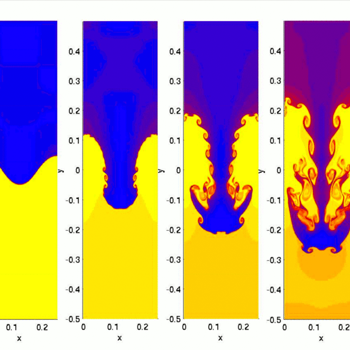What's the unit of enthalpy?
2 Answers
Enthalpy is a measure of heat flow at a constant pressure.
In other words:
#\mathbf(DeltaH = q_p)#
You should have used this relationship before in General Chemistry. You just may not have known it at the time. For instance, dropping a piece of metal in water? That's at a constant surrounding atmospheric pressure.
We can show this by starting from the following equations:
#\mathbf(DeltaH = DeltaU + Delta(PV))# #" "bb((1))#
#Delta(PV) = PDeltaV + VDeltaP + DeltaPDeltaV# #" "bb((1.1))#
(where we have simply included very combination for how pressure and volume could change)
#\mathbf(DeltaU = q + w)# #" "bb((2))#
#w = -PDeltaV# #" "bb((2.1))# where
#H# is enthalpy,#U# is internal energy,#q# is heat flow,#w# is work,#P# is pressure, and#V# is volume.
Thus:
#DeltaH = q - cancel(PDeltaV + PDeltaV) + VDeltaP + DeltaPDeltaV#
but the pressure is assumed to be constant, so:
#DeltaH = q + cancel(VDeltaP + DeltaPDeltaV)#
As a result, we define a new relation; at a constant pressure:
#q = q_p#
So:
#color(blue)(DeltaH = q_p)#
Why does that help us? Well, we should know that heat flow is going to be in
So naturally, enthalpy must then be in
#\mathbf("J")# .
Of course, enthalpy can have other units. It's not to say it can't be converted to other units, but the basic unit for it is
Some other forms of enthalpy with their common units:
Molar enthalpy
#DeltabarH: " kJ/mol"#
Standard enthalpy of reaction#DeltaH_"rxn"^@: " kJ/mol"#
Standard enthalpy of formation#DeltaH_f^@: " kJ/mol"#


